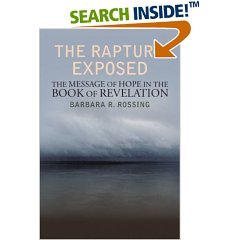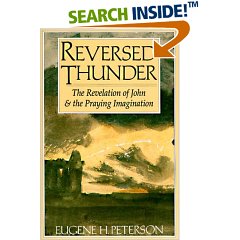
If you are interested in doing some further reading on the topic of 'Second Coming' I would like to recommend two books. First, Barbara R. Rossings, The Rapture Exposed: The Message of Hope in the Book of Revelation. In this book Rossing does a number of things. First and foremost she debunks the entire 'Rapture' theory, showing that it simply does not exist in the Bible. It is never mentioned in Revelation (the best proponents can do is say that it is suggested) and the passage in Thessalonians that proponents quote is misinterpreted. Rossing goes on to offer a very thoughtful criticism of the 'Left Behind' series. Her main proposal is that the series glorifies violence and destruction of humanity and of all creation, which according to her interpretation of Revelation goes against all that Revelation is really about. Finally Rossing goes on to explain her interpretation of Revelation, one that does offer hope. Rossing obviously reads Revelation not only in the Apocalyptic genre, which it of course is a part of, but Rossing also sees a great deal of Covenental theology in Revelation. Throughout the prophets God is described as acting to re-establish a covenant with the people who broke it. Rossing correctly read Revelation as a whole instead of in disjointed bits and pieces which so many popular televangelists do (Jack van Impe and the like). Most important for this reading, Rossing begins with the ending. At the end of Revelation we are given images of the new Heaven and the new Earth. We here the words that are often recited at funerals Rev 21:4, There will be no more death or mourning or crying or pain, for the old order of things has passed away." NIV Rossing suggests that we read all that precedes these passages in the light of the end result. This is a story of God restoring relationship, not destroying relationship. Her scholarship is excellent and her writing engaging.

Another book I would like to recommend is Eugene Peterson's 'Reversed Thunder'. Peterson's work is a beautifully written commentary on the book of Revelation, the very best I have ever read when it comes to explaining Revelation to the lay person. Peterson does not read Revelation as a prophecy text book like so many popular TV preachers. He reads it as poetry, a theory is explains in the book. Unlike Rossing, Peterson is not trying to debunk anything, he is simply trying to explain Revelation to the everday person. So he talks about Christ and the Church and Heaven. But he does not shy away from what makes Revelation most challenging, which isn't discerning who the anti-christ is. He talks about what Revelation says about politics and economics. Peterson is a fine scholar, an artistic writer and probably the best translator of the Bible that I have ever read.
I recommend both of the these books because they explain the purpose of Revelation in a day and time in which Revelation is more misunderstood and misapplied than ever. Both authors acknowledge that Revelation is meant to challenge the disciple to greater faithfulness, but deny the fear that so many find in it. They explain how Revelation helps us to find the word of truth in today's world, but deny that it's purpose to tell the future.
No comments:
Post a Comment